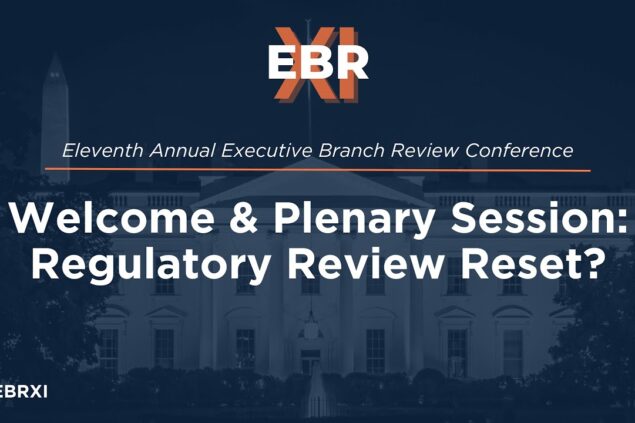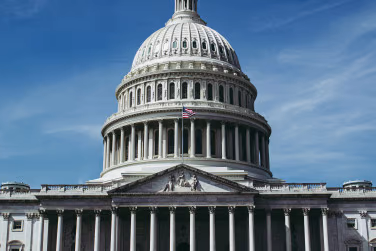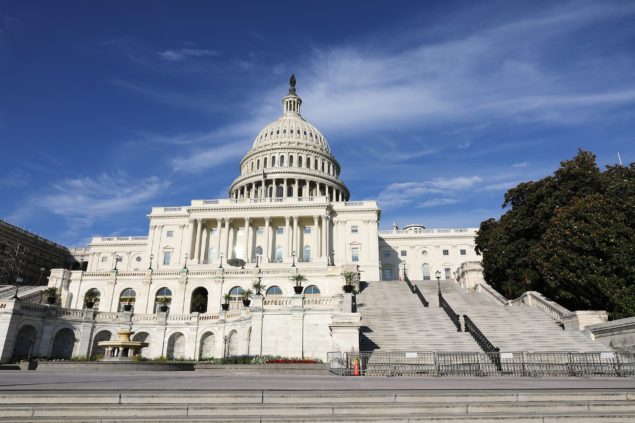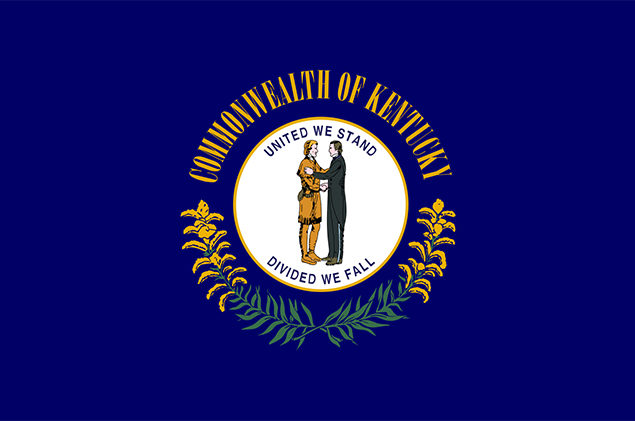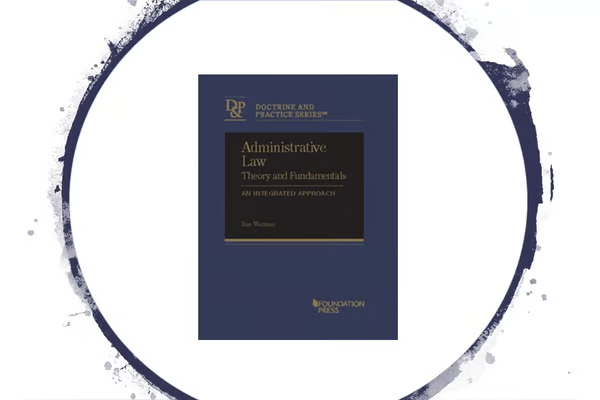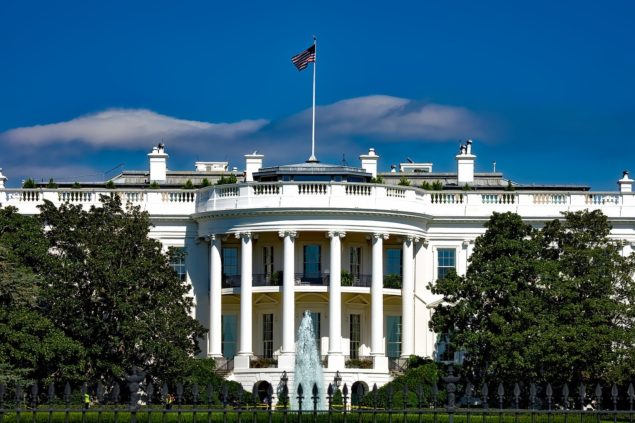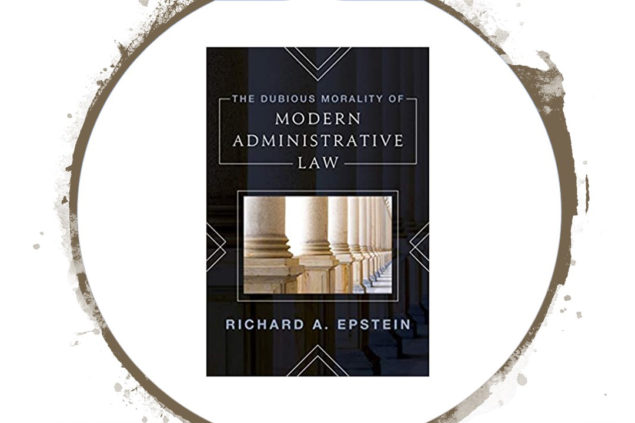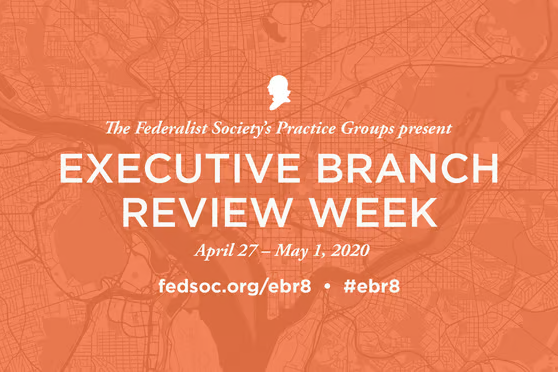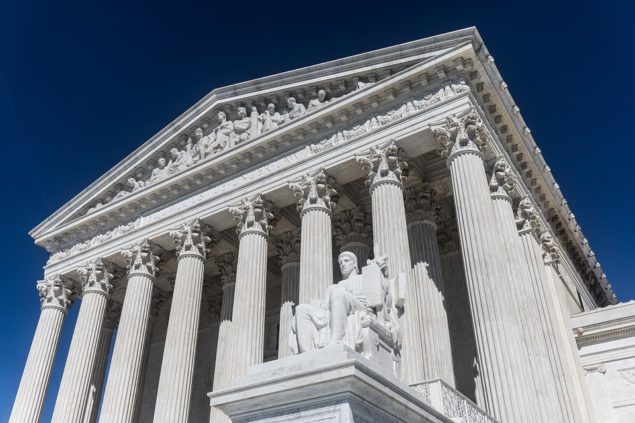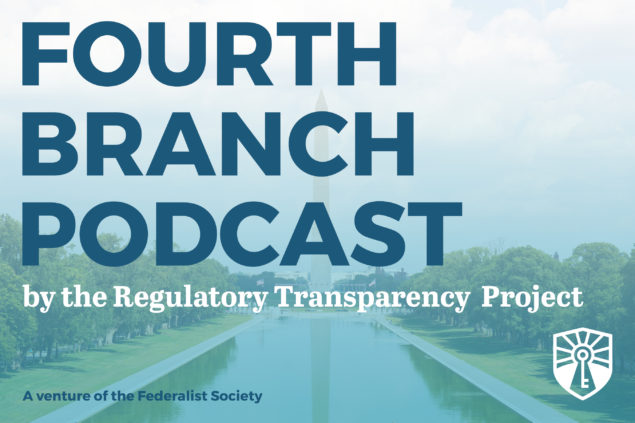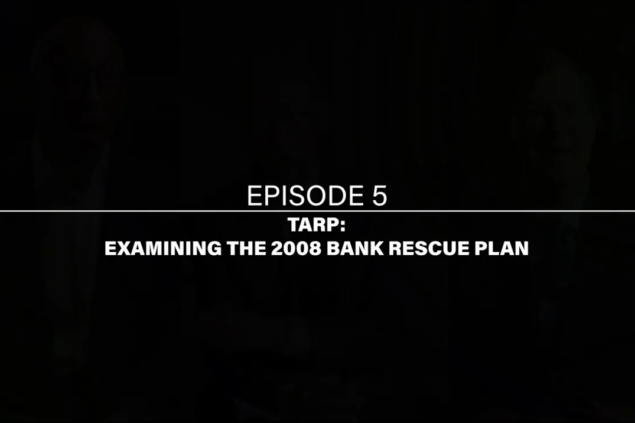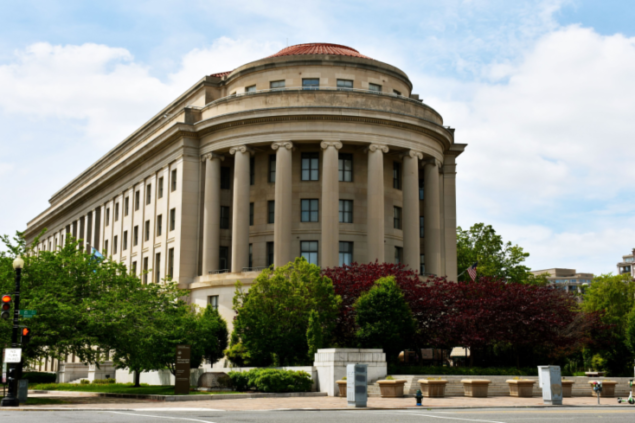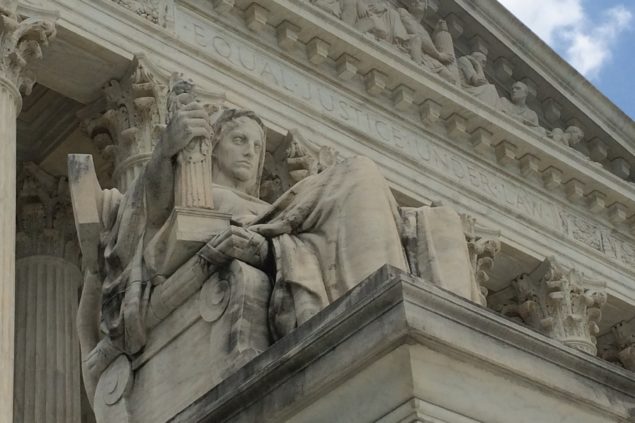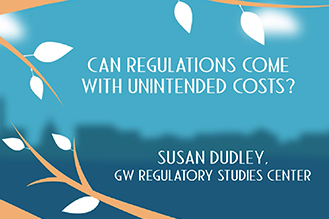Regulatory Process
Topics
Federal agencies are tasked with implementing the broad, and often vague, goals provided by Congress in legislation and then signed into law by the President. How do agencies follow established regulatory procedures that promote the rule of law and transparency? Where do they depart from such standards?
The Proper Role of Rules in a Gloriously Unruly Economy
With examples of regulatory policies that failed to achieve their stated goals and regulatory reforms that proved effective and beneficial to the public, the authors of this paper argue for an approach to regulation that encourages, rather than stifles, creativity and competition. This kind of rulemaking, they suggest, makes for a stronger and more inclusive economy.
Read this paperGovernment Regulation: The Good, The Bad, & The Ugly
The authors of this paper examine the important role regulations play in a vibrant economy, how they differ from other government programs, why they can produce unintended consequences, and how reforms could help us achieve the benefits regulations can provide with fewer negative outcomes.
Read this paperCourthouse Steps Oral Argument: Corner Post, Inc. v. Board of Governors of the Federal Reserve System
On February 20, 2024, the U.S. Supreme Court will hear oral argument in Corner Post, Inc. v. Board of Governors of…
Listen to this podcastLoper Bright and the Next Steps for Chevron Deference at the Supreme Court
This Term, the Supreme Court will hear Loper Bright Enterprises v. Raimondo—a case concerning judicial deference to agency interpretations of ambiguous…
Listen to this podcastLitigation Update: Loper Bright Enterprises v. Raimondo
For the past thirty years, the Magnuson-Stevens Act (MSA) has given the National Marine Fisheries Service (NMFS), an arm of…
Listen to this podcastDeep Dive Episode 277 – Welcome & Plenary Session: Regulatory Review Reset?
Eleventh Annual Executive Branch Review Conference — EBRXI Theme: Transparency, Accountability, and the Administrative State The White House recently released much-anticipated…
Listen to this podcastVirginia’s New Approach to Regulatory Modernization
Regulatory modernization has been a topic of nationwide interest in recent months. With its recently revised Circular A-4, the federal…
Listen to this podcastA Discussion on NMFS’s Regulatory Authority: Whales, Speed Limits, and Legal Questions
The National Marine Fisheries Service (NMFS), an arm of the National Oceanic and Atmospheric Administration (NOAA), recently saw one of…
Listen to this podcastExplainer Episode 54 – Examining the Biden Administration’s Proposed Changes to Cost-Benefit Analysis
On April 6, 2023, the Biden Administration announced two new efforts to “modernize regulatory review” – the first through the…
Listen to this podcastExplainer Episode 53 – Biologics, Biosimilars, and the Two-fold U.S. Approval Framework’s Possible Impact on Prices
Biosimilars, a category of biologic (medicine derived from a living organism), require approval, at least in the U.S. by the…
Listen to this podcastDeep Dive Episode 264 – The SEC’s ESG Reporting Rule: Understanding the Debate over Climate-Risk Disclosure Requirements
In March 2022, the Securities and Exchange Commission proposed a new rule that would establish climate-risk disclosure requirements for public…
Listen to this podcastDeep Dive Episode 261 – Navigating the Axon Decision: Understanding its Implications for Federal Agencies and Administrative Law
In a highly anticipated decision, the Supreme Court held in Axon Enterprise, Inc. v. FTC (consolidated with Cochran v. SEC) that federal district courts have jurisdiction to resolve challenges to the structure and existence of federal agencies whose decisions are subject to review in a court of appeals.
Listen to this podcastDeep Dive Episode 251 – FTC: Cost/Benefit Analysis of Proposed Rules – A Deeper Dive
A panel of experts explore how a federal agency undertakes the cost-benefit analysis for proposed rules, comparing independent agencies to those subject to OIRA review, and provide practical tips for lawyers and economists working on agency rulemaking comments.
Listen to this podcastDeep Dive Episode 248 – Creatures of Statute III: Congress’ Responsibility to Answer the Major Questions
In the third in a lecture series on the administrative state, experts discuss the major questions doctrine and how Congress may respond to the Supreme Court’s decision in West Virginia v. EPA.
Listen to this podcastDeep Dive Episode 247 – Creatures of Statute II: Administrative Agencies and Policymaking
In part two of our series on the administrative state, regulatory experts focus on the role of the administrative agencies in policymaking.
Listen to this podcastDeep Dive Episode 246 – Creatures of Statute: Administrative Agencies in Practice
In this episode, regulatory experts share first-hand the function of administrative agencies, and their role in the federal government.
Listen to this podcastDeep Dive Episode 232 – The Implications of Jarkesy v. SEC for Administrative Tribunals
In this episode, experts discuss the Jarkesy v. SEC case, implications of the case on the future of administrative tribunals, and continuing litigation on the issue.
Listen to this podcastDeep Dive Episode 230 – Who Is Regulating the Regulators?
Susan Dudley and Paul Ray share their perspectives on the importance of this “obscure but powerful” office, and what the lack of a confirmed administrator means for the executive branch and its agencies.
Listen to this podcastExplainer Episode 37 – The Defense Production Act During War and Peacetime
J. Kennerly Davis, Jr. discusses the origins of the Defense Production Act and recent presidents’ invocation of the Act in pursuit of public policy objectives.
Listen to this podcastDeep Dive Episode 228 – Does the Federal Energy Regulatory Commission (FERC) Have Authority To Regulate the Climate?
J. Kennerly Davis, Jr. and Bernard McNamee discuss recent policy proposals and statements from the Federal Energy Regulatory Commission.
Listen to this podcastDeep Dive Episode 215 – Sundown for the SUNSET Rule?
An expert panel joined us to discuss HHS’s SUNSET rule, the effort to repeal it, and possible future HHS actions.
Listen to this podcastExplainer Episode 32 – The Vaccine Mandate Cases and the Future of Administrative Law
An expert panel breaks down the implications of the Supreme Court’s vaccine mandate rulings for the future of administrative law.
Listen to this podcastDeep Dive Episode 197 – Competition at a Crossroads: Will the Executive Order on Competition Advance Competition, or Restrict It?
A distinguished panel joined us to lay out the arguments behind and implications of Biden’s executive order on competition.
Listen to this podcastDeep Dive Episode 190 – The Implications of the Latest Congressional Review Act Disapprovals
Todd Gaziano and Professor Jonathan Adler discuss the CRA and the ramifications of its use on the three rules this year.
Listen to this podcastDeep Dive Episode 188 – Immigration Policymaking in the Biden Administration
An expert panel debates the appropriate regulatory process for immigration policymaking.
Listen to this podcastDeep Dive Episode 183 – The Path Forward on Agency Guidance
An expert panel discusses all things agency guidance – what it is, how and why it is issued, pros and cons of current guidance practices, and more.
Listen to this podcastDeep Dive Episode 181 – State of Emergency? Kentucky’s Legislature vs. Governor
Mitchel Denham and Oliver Dunford debate the implications of two cases that could shape the future of emergency government powers in Kentucky.
Listen to this podcastDeep Dive Episode 180 – Book Review: Administrative Law Theory and Fundamentals: An Integrated Approach
Professors Ilan Wurman and Richard Epstein discuss Professor Wurman’s new casebook on administrative law.
Listen to this podcastExplainer Episode 25 – President Biden’s Memo on “Modernizing Regulatory Review”
Ken Davis joined the podcast to discuss why and how President Biden’s memo on Modernizing Regulatory Review could significantly alter the regulatory review process.
Listen to this podcastDeep Dive Episode 161 – Congressional Review Act: First Branch Gets the Last Word
In this live podcast, experts review the overriding purposes of the CRA and do a deep dive into its technical elements.
Listen to this podcastDeep Dive Episode 152 – COVID-19 Regulatory Waivers and Suspensions: What Will the Biden Administration Do?
Will the Biden administration continue existing waivers and suspensions as is, or will it take a new tack on regulatory flexibility during the continuing pandemic?
Listen to this podcastDeep Dive Episode 151 – Public Input in Agency Rulemaking
An expert panel considers the legal and policy issues surrounding whether, and how, an agency should take account of public comments in rulemaking.
Listen to this podcastDeep Dive Episode 145 – The True Extent of Executive Power
The Federalist Society’s Georgetown Law Student Chapter and the Regulatory Transparency Project hosted John Yoo and Saikrishna Prakash for a discussion on the extent of executive power.
Listen to this podcastDeep Dive Episode 126 – Minutes to Midnight, or Teeing Up a Second Term?
To what extent can the current administration issue “midnight rules” affecting policy beyond January 20? And to what extent could the Congressional Review Act permanently erase those rules?
Listen to this podcastDeep Dive Episode 121 – Book Review: The Dubious Morality of Modern Administrative Law
In this live podcast, Prof. Adam J. White interviews Prof. Richard Epstein about his new book, and then Prof. Epstein fields caller questions on administrative law.
Listen to this podcastDeep Dive Episode 116 – Surviving COVID-19: The Small Business Perspective
In this episode, Karen Harned discusses policies that can help or harm the resilience of small business in the time of COVID-19.
Listen to this podcastDeep Dive Episode 113 – Executive Orders on Guidance: Implications and Next Steps
In this episode, experts discuss a 2019 executive order that imposed a series of restrictions and requirements on Federal agencies, and even included a requirement that agencies publish their guidance on the internet.
Listen to this podcastDeep Dive Episode 107 – COVID-19 in the Workplace: Mandated Paid Sick Leave
On March 18, the Senate passed and the President signed into law the “Families First Coronavirus Response Act.” Karen Harned and James Paretti will walk listeners through key provisions of this new law.
Listen to this podcastDeep Dive Episode 88 – The Whys and Hows of Commenting on Rules
In this episode, Susan Dudley, Karen Harned, and Brian Mannix give an overview of the process and value of the public commenting process for proposed regulations.
Listen to this podcastDeep Dive Episode 87 – The Dubious Morality of Modern Administrative Law
This podcast features audio from a recent event held at the University of California, Berkeley, featuring the insights of Richard Epstein and Daniel Farber.
Listen to this podcastDeep Dive Episode 80 – New Executive Orders Directing Agency Guidance
How significant are these orders? What impact will they have on regulatory policymaking? What has been the initial reaction to these new measures?
Listen to this podcastDeep Dive Episode 79 – An Update on Gundy v. United States
Gundy v. U.S. has enormous implications for how much power federal bureaucrats can be given by Congress. In this episode, panelists discuss this case and a potential future without such extensive power for federal agencies.
Listen to this podcastDeep Dive Episode 77 – Book Review: The Capitalism Paradox: How Cooperation Enables Free Market Competition
In this episode, Paul Rubin, the world’s leading expert on cooperative capitalism, discusses his new book, The Capitalism Paradox: How Cooperation Enables Free Market Competition.
Listen to this podcastDeep Dive Episode 66 – Americans with Disabilities Act Litigation Enters a New Frontier – Websites
Karen Harned will provide the background on this new trend in ADA litigation, the current state of the law, and highlight a case the Supreme Court is being asked to take this next term on the issue.
Listen to this podcastDeep Dive Episode 65 – Subdelegations of Rulemaking Power and the Appointments Clause
In this episode, experts discuss whether the constitution permits inferior officers in federal agencies to issue binding rules.
Listen to this podcastDeep Dive Episode 62 – An Update on Kisor v. Wilkie
In this episode, Karen Harned and Stephen Vaden discuss the Supreme Court’s recent decision in Kisor v. Wilkie, a case with important implications for judicial deference to agency interpretation of rules.
Listen to this podcastDeep Dive Episode 61 – Gundy v. United States: Revisiting the Nondelegation Doctrine, or Not?
How much discretion can Congress delegate to federal agencies and their officers while still retaining the separation of powers? Mark Chenoweth discusses the Supreme Court’s decision in Gundy v. United States and its implications going forward for the nondelegation doctrine.
Listen to this podcastDeep Dive Episode 55 – Regulatory Reform Report Card: Agency General Counsel Perspective
In this episode, General Counsels from a number of federal agencies take stock of the current administration’s regulatory reform agenda two years on.
Listen to this podcastDeep Dive Episode 40 – Kisor v. Wilkie
In this Fourth Branch podcast, Stephen Vaden moderates a discussion between Karen Harned and Andrew Varcoe on Kisor v. Wilkie, a case which has broad and significant implications for issues surrounding judicial deference to agency interpretation of regulations.
Listen to this podcastDeep Dive Episode 25 – The Commenting Power: Agency Accountability through Public Participation
Did you know that you have a say in the U.S. government’s regulatory process? Donald Kochan (Chapman University Fowler School of Law) and Maleka Momand (Argive) discuss the notice and comment rulemaking process in this episode of Fourth Branch.
Listen to this podcastDeep Dive Episode 24 – Regulatory Scorecard: A Conversation with Administrator Neomi Rao
In this episode of Fourth Branch, Administrator Neomi Rao (Office of Information and Regulatory Affairs) shares her thoughts on federal regulatory changes over the previous year.
Listen to this podcastDeep Dive Episode 21 – Shining a Light on Regulatory Dark Matter: Regulating Through Guidance
Stephen Cox (Department of Justice) and Paul R. Noe (American Forest & Paper Association) discuss concerns regarding the development and use of guidance documents by agencies and how these concerns are being addressed by the Department of Justice.
Listen to this podcastDeep Dive Episode 20 – The 2017 Mercatus Report: The Implications of Regulating Over the Long-Term
Patrick McLaughlin (Mercatus Center) discuss his study on regulation’s effect on the decision-making processes of individual businesses and, as a result, on economic growth.
Listen to this podcastDeep Dive Episode 9 – Bureaucracy in America
Joseph Postell (University of Colorado-Colorado Springs) discusses the administrative state, how it has changed over time, and how these changes have influenced our constitutional system.
Listen to this podcastDeep Dive Episode 6 – Laws, Regulations, and “Regulatory Dark Matter”
Wayne Crews (Competitive Enterprise Institute) explores “regulatory dark matter”: the thousands of executive branch and federal agency proclamations and issuances that carry practical (if not always technically legally) binding regulatory effect.
Listen to this podcastRegulation and Red Tape: TARP: Examining the 2008 Bank Rescue Plan
The success of TARP is still debated today by experts on both sides of the issue. Did TARP save the economy, or was it an excessive government intervention?
Courthouse Steps Oral Argument: Corner Post, Inc. v. Board of Governors of the Federal Reserve System
On February 20, 2024, the U.S. Supreme Court will hear oral argument in Corner Post, Inc. v. Board of Governors of…
Watch this videoCongress and the Future of Agency Authority: A Discussion of Three Major Administrative Law Cases and Their Implications for Congress
The Federalist Society’s Capitol Hill Chapter and the Regulatory Transparency Project invite you to join them for a luncheon at…
Watch this videoRegulation and Red Tape: Tax Inversions: Unpacking the Pfizer Case
In episode four of the “Regulation and Red Tape ” series, experts provide an exposition of corporate tax inversions, spotlighting Pfizer’s case, and raise pivotal questions concerning the balance of powers when time-sensitive policy matters are at stake.
Watch this videoLoper Bright and the Next Steps for Chevron Deference at the Supreme Court
This Term, the Supreme Court will hear Loper Bright Enterprises v. Raimondo—a case concerning judicial deference to agency interpretations of ambiguous…
Watch this videoLitigation Update: Loper Bright Enterprises v. Raimondo
For the past thirty years, the Magnuson-Stevens Act (MSA) has given the National Marine Fisheries Service (NMFS), an arm of…
Watch this videoRegulation and Red Tape: Boucher v. USDA: Navigating the Swampbuster Provisions
Have you ever received a notice from the government that you violated a rule that you didn’t know about?
In the 1990’s, the Boucher family removed nine trees from their property as an attempt to mitigate the buildup of trash and dumping on their land. This action triggered a United States Department of Agriculture (USDA) investigation suspecting environmental damage. Consequently, the Bouchers lost eligibility for USDA benefits, including “Swampbuster” provisions. In Boucher vs. USDA, the government grapples with balancing natural resource protection and individual liberties. This case underscores the long and painstaking nature of government processes, emphasizing the time and diligence often required for justice and good governance.
In the third episode of “Regulation and Red Tape,” experts highlight the broader implications of Boucher vs. USDA and consider the balance between regulatory enforcement and individual rights.
Watch this videoRegulation and Red Tape: Sackett v. EPA: A Tale of Wetland Regulations
At what point can Americans go to court to defend themselves against agency enforcement action?
This crucial question arose for the Sackett family when they embarked on the initial stages of constructing their home near Priest Lake, Idaho. EPA agents arrived on their property and asserted that it was a federally protected wetland. The EPA subsequently issued a compliance order that would subject the Sacketts to a fine of $37,500 a day. What followed was years of legal battles between the Sackett family and the EPA, culminating in two pivotal Supreme Court decisions.
In the second episode of the “Regulation and Red Tape” series, experts delve into the story of the Sackett family, their experience with the EPA, and the due process questions raised by the story.
Watch this videoRegulation and Red Tape: Mergers, Monopolies, and the FTC
Since the 19th century, the United States government has intervened to combat the growth of monopolies in our economy. The…
Watch this videoOfficial Trailer: The Regulation and Red Tape Series
In this new video series from the Regulatory Transparency Project, leading legal experts will debate some of the most controversial regulatory issues in America today. Moderated by the Hon. Paul J. Ray, “Regulation and Red Tape” will tell true stories of how federal regulatory actions impact the lives of ordinary Americans and the economy they rely on. In watching this series, you will have the opportunity to learn more about how the regulatory process functions, consider how and when regulatory action is necessary, and evaluate the trade-offs involved when the regulatory state acts.
Watch this videoVirginia’s New Approach to Regulatory Modernization
Regulatory modernization has been a topic of nationwide interest in recent months. With its recently revised Circular A-4, the federal…
Watch this videoA Discussion on NMFS’s Regulatory Authority: Whales, Speed Limits, and Legal Questions
The National Marine Fisheries Service (NMFS), an arm of the National Oceanic and Atmospheric Administration (NOAA), recently saw one of…
Watch this videoThe SEC’s ESG Reporting Rule: Understanding the Debate over Climate-Risk Disclosure Requirements
In March 2022, the Securities and Exchange Commission proposed a new rule that would establish climate-risk disclosure requirements for public companies.
Watch this videoFood Safety: When Regulatory Jurisdictional Battles and Public Safety Collide
Food is a necessity for life. It should therefore surprise few that the federal government regulates the production and processing of food before it reaches our dinner tables.
Watch this videoWelcome & Plenary Session: Regulatory Review Reset?
The Regulatory Transparency Project was pleased to co-sponsor the opening session of the Federalist Society’s Eleventh Annual Executive Branch Review Conference on Transparency, Accountability, and the Administrative State.
Watch this videoNavigating the Axon Decision: Understanding its Implications for Federal Agencies and Administrative Law
In a highly anticipated decision, the Supreme Court held in Axon Enterprise, Inc. v. FTC (consolidated with Cochran v. SEC) that federal district courts have jurisdiction to resolve challenges to the structure and existence of federal agencies whose decisions are subject to review in a court of appeals.
Watch this videoFTC: Cost/Benefit Analysis of Proposed Rules – A Deeper Dive
Although primarily an enforcement agency, the Federal Trade Commission (FTC) has issued a historic number of proposed rules over the…
Watch this videoCreatures of Statute III: Congress’ Responsibility to Answer the Major Questions
In the third in a lecture series on the administrative state, experts discuss the major questions doctrine and how Congress may respond to the Supreme Court’s decision in West Virginia v. EPA.
Watch this videoCreatures of Statute II: Administrative Agencies and Policymaking
This second event of our co-sponsored series on the administrative state focused on the role of the administrative agencies in policymaking
Watch this videoBitcoin Cowboys: Will Wyoming Become the Next Crypto Capital?
In this Fourth Branch video, regulatory and cryptocurrency experts discuss Wyoming’s unique approach allow it to become the center of this innovative industry and more.
Watch this videoCreatures of Statute: Administrative Agencies in Practice
In this luncheon discussion, regulatory experts share first-hand the function of administrative agencies, and their role in the federal government.
Watch this videoThe Implications of Jarkesy v. SEC for Administrative Tribunals
In this program, experts discuss the Jarkesy v. SEC case, implications of the case on the future of administrative tribunals, and continuing litigation on the issue.
Watch this videoWho Is Regulating the Regulators?
Susan Dudley and Paul Ray shared their perspectives on the importance of this “obscure but powerful” office, and what the lack of a confirmed administrator means for the executive branch and its agencies.
Watch this videoDoes the Federal Energy Regulatory Commission (FERC) Have Authority To Regulate the Climate?
J. Kennerly Davis, Jr. and Bernard McNamee discuss recent policy proposals and statements from the Federal Energy Regulatory Commission.
Watch this videoSundown for the SUNSET Rule?
An expert panel joined us to discuss HHS’s SUNSET rule, the effort to repeal it, and possible future HHS actions.
Watch this videoCompetition at a Crossroads: Will the EO on Competition Advance Competition, or Restrict It?
A distinguished panel joined us to lay out the arguments behind and implications of Biden’s executive order on competition.
Watch this videoThe Implications of the Latest Congressional Review Act Disapprovals
Professors Jonathan Adler and Todd Gaziano discuss the CRA and its use on 3 rules earlier this year.
Watch this videoImmigration Policymaking in the Biden Administration
An expert panel debates the appropriate regulatory process for immigration policymaking.
Watch this videoThe Path Forward on Agency Guidance
On Friday, June 18, the Regulatory Transparency Project hosted a panel discussion on all things agency guidance.
Watch this videoTalks with Authors: Administrative Law Theory and Fundamentals: An Integrated Approach
Professors Ilan Wurman and Richard Epstein discuss Professor Wurman’s new casebook on administrative law.
Watch this videoHow Do Regulatory Agencies Implement Laws?
After a law is passed by Congress, how is it implemented? Susan Dudley explains.
Watch this videoThe True Extent of Executive Power
The Federalist Society’s Georgetown Law Student Chapter and the Regulatory Transparency Project hosted John C. Yoo and Saikrishna B. Prakash for a discussion on the extent of executive power.
Watch this videoRegulation Over the Decades
How have the regulations emanating from Washington changed over the years? Chris DeMuth, Distinguished Fellow at the Hudson Institute, draws from personal experience as he discusses the transformation of the regulatory state over the decades.
Watch this videoCan Regulations Come With Unintended Costs?
While the goals of regulations are often admirable, regulations may come with unintended consequences. Sometimes, regulations can hurt those they were intended to benefit. Susan Dudley, Director of the George Washington University Regulatory Studies Center, discusses these unintended costs and her work at the Regulatory Studies Center.
Watch this videoIncentives for Regulators?
How do individual regulators operate within agencies to create and maintain regulations? Are regulators incentivized to pursue policy goals defined by Congress, their own policy preferences, or other factors? How does the regulatory institution itself contribute to policy goals? George J. Terwilliger, III examines these questions.
Watch this videoCan Economic Incentives Produce a Good Outcome in Regulation?
Can providing market incentives produce desirable and more efficient outcomes in regulation? Chris DeMuth, Distinguished Fellow at the Hudson Institute, presents as a case study President Ronald Reagan’s permitting solution to the problem of lead in gasoline.
Watch this videoHow Do Regulations Get Made?
What is the mechanism by which regulations are developed, finalized, and updated? How can this process be improved? Susan Dudley, Director of the George Washington University Regulatory Studies Center, provides insight into these questions.
Watch this videoRegulation from Washington: Exploring Unseen Costs
Regulations emanate from Washington and “affect every aspect of our lives, but we’re often unaware of it because they do so in hidden ways.” What are these effects and do they benefit American workers, companies, and consumers? A variety of experts on regulatory issues discuss this important question.
Watch this videoRegulation & the American Dream
Arguably, regulation has helped us achieve the American Dream. The benefits are numerous. But have regulations gone too far? The Regulatory Transparency Project’s Fourth Branch video series will explore this question.
Watch this videoAI Poses a Serious Threat to the Legal Profession. It Also Presents an Extraordinary Opportunity.
The rapid emergence of high-profile applications for Artificial Intelligence—including advanced search engines, recommendation systems, and generative tools—has given rise to a wide-ranging discussion and often spirited debate about what might result from the accelerating deployment of this revolutionary technology.
Read this articleADA Testers Can Keep Testing . . . For Now
On December 5, the Supreme Court issued a unanimous opinion by Justice Amy Coney Barrett in Acheson Hotels LLC v. Laufer dismissing the case as moot. Acheson concerned whether Article III of the Constitution provides “tester” plaintiffs standing to sue for alleged Americans with Disabilities Act violations, even when such plaintiffs have no intention of patronizing the business they are suing.
Read this articleTesting the Testers: The Supreme Court is Set to Consider the Standing of Private Citizens Who Sue to Enforce the Americans with Disabilities Act
Karen Harned
On October 4, the Supreme Court will hear arguments in Acheson Hotels LLC v. Laufer. The case explores whether so-called “tester” plaintiffs under the Americans with Disabilities Act have standing to sue for alleged ADA violations under Article III of the Constitution, even when such plaintiffs have no intention of patronizing the business they are suing.
Read this articleIs It Lawful to Use Regulatory Impact Analysis to Achieve Equity?
J. Kennerly Davis, Jr.
Circular A-4, issued by the Office of Management and Budget (OMB), provides detailed guidance to federal agencies regarding the methodological attributes of sound regulatory impact analysis. The Biden administration has proposed modifications to Circular A-4 that were recently peer reviewed in preparation for the finalization and public release of a modified Circular A-4, perhaps by the end of this calendar year.
Read this articleEEOC Proposes Expansive Pregnant Workers Fairness Act Regulations
Rachel Morrison
On August 7, 2023, the Equal Employment Opportunity Commission (EEOC) issued proposed regulations implementing the Pregnant Workers Fairness Act (PWFA). The Commission is accepting public comment on its proposal until Tuesday, October 10.
Read this articleHHS Proposes Special HIPAA Privacy Rules for “Reproductive Health Care” Information
Rachel Morrison
In accord with the Biden administration’s pro-abortion agenda, the U.S. Department of Health and Human Services issued a notice of proposed rulemaking (NPRM) on April 17, 2023, titled “HIPAA Privacy Rule To Support Reproductive Health Care Privacy.” The NPRM would modify privacy standards under the Health Insurance Portability and Accountability Act of 1996 (HIPAA) for information related to “reproductive health care.”
Read this articleED Proposes Title IX Athletics Rule Requiring Participation Based on Gender Identity
Rachel Morrison
On April 13, 2023, the Department of Education (ED) issued a notice of proposed rulemaking (NPRM) titled “Nondiscrimination on the Basis of Sex in Education Programs or Activities Receiving Federal Financial Assistance: Sex-Related Eligibility Criteria for Male and Female Athletic Teams.” This Athletics NPRM would establish a new regulatory standard under Title IX that would govern sex-related criteria as it relates to gender identity for participation on sex-specific athletics teams at federally funded educational institutions. The 32-day public comment period closes on Monday, May 15.
Read this articleA Falling Tide Reveals A Lot Of Things
J. Kennerly Davis, Jr.
If we can realign our political debates and policy analyses to focus on the flaws and failures of the progressive model of regulation, we will be much better prepared when the tide goes out the next time.
Read this articleNine Agencies Propose Regulations for Partnerships with Faith-Based and Neighborhood Organizations
On January 13, 2023, nine agencies issued a notice of proposed rulemaking (NPRM) titled “Partnerships With Faith-Based and Neighborhood Organizations” to “clarify protections for beneficiaries and potential beneficiaries receiving federally funded social services and the rights and obligations of organizations providing such services.”
Read this articleEducation Department Proposes Rescinding Religious Student Group Protections and Requests Info on Campus Free Speech Regulations
Rachel Morrison
On February 22, 2023, the Department of Education (ED) published in the Federal Register a notice of proposed rulemaking (NPRM) and a request for information (RFI) relating to First Amendment religious exercise and free speech regulations for institutions of higher education.
Read this articleSupreme Court to Hear Two Challenges to President Biden’s Student Loan Forgiveness Program
Karen Harned
In December, the Supreme Court granted certiorari in two cases challenging the student loan forgiveness program that President Biden announced in August of last year. Biden v. Nebraska was brought by six states: Arkansas, Iowa, Kansas, Missouri, Nebraska, and South Carolina. Department of Education v. Brown was brought by two individuals with student loans.
Read this article“Those who fail to learn from history are condemned to repeat it.”
Susan Dudley
In a Wall Street Journal op-ed, Howard Beales and Tim Muris review the results of the Federal Trade Commission’s previous efforts (in the 1970s) to reshape the economy through rushed rulemaking; it is a disastrous history that the FTC’s new majority seems determined to repeat.
Read this articleGo Ahead, You Do It For Us
Wayne A. Abernathy
Rule of Law or Rule of Experts? Almost exactly 9 years ago, I spoke to this question, posed by the erosion of the Constitution’s separation of powers. At a legal symposium in Philadelphia, I raised the problem of concentration of say-so in federal financial regulators.
Read this articleAn Empty Attack on the Nondelegation Doctrine
Peter Wallison
Peter Wallison argues that the Constitution’s separation of powers provides ample justification for a revival of the nondelegation doctrine.
Read this articleHHS Proposal Adds Teeth to Requirements for Retrospective Regulatory Review
J. Kennerly Davis
There is bipartisan agreement that the cost effectiveness of regulation could be greatly improved if regulatory agencies engaged in systematic retrospective analysis of the benefits and costs of the rules and regulations that they have previously enacted. Such analysis could identify for amendment or rescission specific regulatory provisions that have proven to be unnecessarily costly, counterproductive, ineffective, or simply outmoded.
Read this articleIt’s Time to Remodel Our Policy Making Processes
J. Kennerly Davis
It is time, past time, for a thorough reassessment of the outsized role that modelers and their models have been playing in the formulation of public policy, the drafting of legislation, and the development of regulations.
Read this articleYes, Judge, We Do Think About Reviewability
Brian Mannix
Parties who disagree with an agency’s action have recourse to the courts; but, if the agency is doing its job properly, it should not be vulnerable for failures of administrative procedure.
Read this articleReigning in Regulatory Dark Matter
J. Kennerly Davis
Curbing administrative overreach to restore the rule of law is an ongoing project without an end in sight. But it’s clear that this most worthy project got a big boost on October 9.
Read this articleMan Bites Dog – Idaho Repeals its Regulatory Code
J. Kennerly Davis
Idaho has long been widely known for the natural wonders that grace its landscape: the rugged wilderness, the snow-capped peaks, the sparkling waters and, of course, the potatoes.
Read this articleThe Many Issues Raised by Senator Warren’s Wealth Tax
J. Kennerly Davis, Jr.
A strong argument can be made that Senator Warren’s proposed wealth tax would be unconstitutional unless apportioned.
Read this articleGovernment Shutdown and Deregulation
Susan Dudley
According to my George Washington University Regulatory Studies Center colleague, Bridget Dooling, a lengthy federal shutdown threatens to derail President Trump’s deregulatory priorities. Not only are covered agencies unable to make progress on their deregulatory initiatives, but the portals for public notice and comment and the office that must review all regulations before they can be issued are caught up in the furlough.
Read this articleRegulatory Year in Review
Eileen J. O'Connor
Within a week of his inauguration, President Trump signed an Executive Order instructing his Administration to take action to keep his campaign promise to reduce government regulation. The EO requires federal agencies to eliminate two regulations for every one they issue, and to hold annual incremental cost of regulations to zero. How is his Administration delivering on those promises?
Read this articleOn the Future of the Chevron Doctrine
J. Kennerly Davis
Joel Nolette is a litigation attorney at Mintz Levin in Boston, and an active member of the Administrative Law & Regulation Practice Group, currently serving on its Executive Committee.
Read this articleManagement’s Duty to Restore The Rule of Law
J. Kennerly Davis
Springtime is the season when most American corporations hold their annual meeting of shareholders. In the course of a typical meeting, board directors will be elected and independent auditors will be appointed. Management will report on operating results and earnings for the fiscal year recently ended, and will outline their strategic business plans for the future. In their presentations, management will make the case that they are fulfilling the fundamental fiduciary duty they have to promote the best interests of the corporation and maximize shareholder value.
Read this articleTrends in Government Priorities, 1960 – 2019
Eileen J. O'Connor
A new report – by Susan Dudley of the George Washington University Regulatory Studies Center and Melinda Warren of the Weidenbaum Center on the Economy, Government, and Public Policy at Washington University in St. Louis – shows that President Trump plans to increase regulatory activity for border security and immigration in 2019, and to dramatically reduce the budgets of agencies involved in environmental regulation.
Read this articleCelebrating Law Day
J. Kennerly Davis, Jr.
Today marks the 60th anniversary of President Eisenhower’s proclamation establishing Law Day. Eisenhower dedicated the day to “distinguish our governmental system from the type of government that rules by might alone.”
Read this articleWill OIRA Extend its Review to Independent Agencies?
Susan Dudley and Eileen J. O'Connor
At the Federalist Society’s Sixth Annual Executive Branch Review Conference, Office of information and Regulatory Affairs (“OIRA”) Administrator Neomi Rao spoke about the new agreement she had hammered out with the Treasury Department to bring OIRA’s review of IRS regulations more in line with its review of other agencies’ regulations. She also strongly hinted that independent regulatory agencies may be next, observing that “OIRA review can promote a more constitutional and coherent regulatory policy,” and that the “good regulatory practices promoted by OIRA can apply to all agencies that regulate the public.” In her latest Forbes column, Susan Dudley agrees. She argues that OIRA review encourages greater transparency, analytical rigor, and accountability in regulations, and urges the Administration to extend long-standing executive orders requiring OIRA review to all agencies that issue regulations binding on the public.
Read this articlePublic Participation and the Power of Persuasion
Brian F. Mannix
I care about regulatory policy, and over the years have filed comments on the record in dozens of agency rulemakings. Most of these comments have been ignored, but many have been influential – a few spectacularly so. I cannot say the same about the votes I have cast in federal elections.
Read this articleReading Past The Headline In OMB’s Report To Congress
Eileen J. O'Connor
As required by the Regulatory Right to Know Act, enacted in 2000, the Office of Management and Budget submits an annual report to Congress outlining the costs and benefits of regulations issued the previous year. It appears, from the latest report, issued in draft form last Friday, that the benefits of regulations in effect the past ten years are three to eight times their costs.
Read this articleAttorney General Directs DOJ to Stop Circumventing APA
Susan Dudley
In remarks to the Federalist Society’s National Lawyers Convention on Friday, Attorney General Jeff Sessions announced new Department of Justice policy on issuing guidance “or similar instruments of future effect by other names, such as letters to regulated entities.”
Read this articleUsing Tax Reform to Reveal the Hidden Cost of the Administrative State
J. Kennerly Davis, Jr.
Regulatory compliance costs impose an enormous burden on the American economy, a hidden tax that we all must pay in higher prices and smaller paychecks.
Read this articleCan Regulations Come with Unintended Costs?
J. Kennerly Davis, Jr.
Can regulations come with unintended costs? They certainly can, and often do.
Read this article





